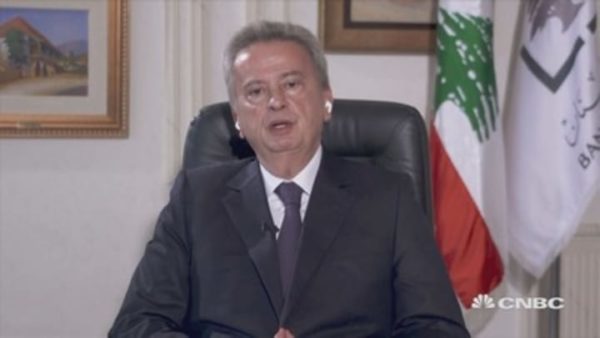KEY POINTS
- Lebanon’s central bank governor, Riad Salameh, said he won’t resign and that he has a strategy to get the country out of its economic crisis.
- Apart from the coronavirus pandemic and ongoing economic troubles, the country is also reeling from a massive explosion in Beirut last month that’s believed to have killed nearly 200 people.
- The government resigned en masse following outrage over the devastating explosion, but central bank chief Salameh says he does not take responsibility for the state Lebanon is in.
Lebanon’s central bank governor told CNBC this week that he wants to help the country in its time of distress — and he won’t resign.
“You cannot resign … in an environment of a crisis, because it would look like going away from the task you have to perform,” Riad Salameh said.
“I don’t want to resign because I am continuing what I have in my mind, as a strategy to get out of this crisis, and I’m sorry to disappoint those who are spreading rumors on my resignation every day,” he told CNBC’s Hadley Gamble on Monday.
Apart from the coronavirus pandemic and ongoing economic troubles, the country is still reeling from a massive explosion last month in Beirut that’s believed to have killed about 200 people. The Aug. 4 blast was blamed on 2,750 tons of ammonium nitrate stored in an unsecured warehouse.
The explosion is estimated to have cost $4.6 billion in damages, according to a World Bank report.
The government resigned en masse following outrage over the devastating explosion which injured over 6,000 and left 300,000 people homeless. Prime Minister Hassan Diab stepped down in the wake of the tragedy and blamed the disaster on endemic corruption.
Mustafa Adib, the former ambassador to Germany, was last week named the new prime minister, though many Lebanese are not convinced he will bring about real change to the country’s political system.
Central bank governor Salameh, however, does not take responsibility for the state Lebanon is in.
The past 10 months have not been easy, he noted, pointing to various factors including sanctions on a Lebanon-based bank, a shutdown in the banking sector, the government’s debt default and the coronavirus.
Salameh defended his efforts, saying: “I am the governor who tried, with the means we have, to maintain the system, not to let the system collapse.”
The Banque du Liban chief was recently rocked by reports that he inflated the central bank’s assets by over $6 billion in 2018.
Both the Financial Times and Reuters cited audited financial accounts, and said the central bank recorded an asset that was $6.8 billion — or about 10.27 trillion Lebanese pounds — which they described as “seigniorage on financial stability,” or a profit made by the government when it prints money. Central banking experts said the asset was used to disguise losses on loans to the government.
But Salameh said the country’s crisis was not caused by monetary policy decisions. “It was provoked by other elements that I have listed, and it was my duty to moderate the effects.”
He added that the country’s reserves were increasing before its financial troubles began. “Monetary policy was filling the gap that was needed to maintain this country afloat.”
Salameh also said the central bank did not create the country’s twin deficits — its current account deficit and fiscal deficit — which have cost Lebanon $81 billion. “We didn’t create the deficit in the government, we have always called for a reduction,” he said.
Lebanon has long been battling an economic crisis, with a 2019 debt-to-GDP (gross domestic product) ratio of 155%, making it the third-most indebted country in the world after Japan and Greece. The Lebanese pound lost over 80% of its value against the dollar in the black market between October to July, and its unemployment rate stood at over 30% at the end of May.


Leave a Reply
You must be logged in to post a comment.